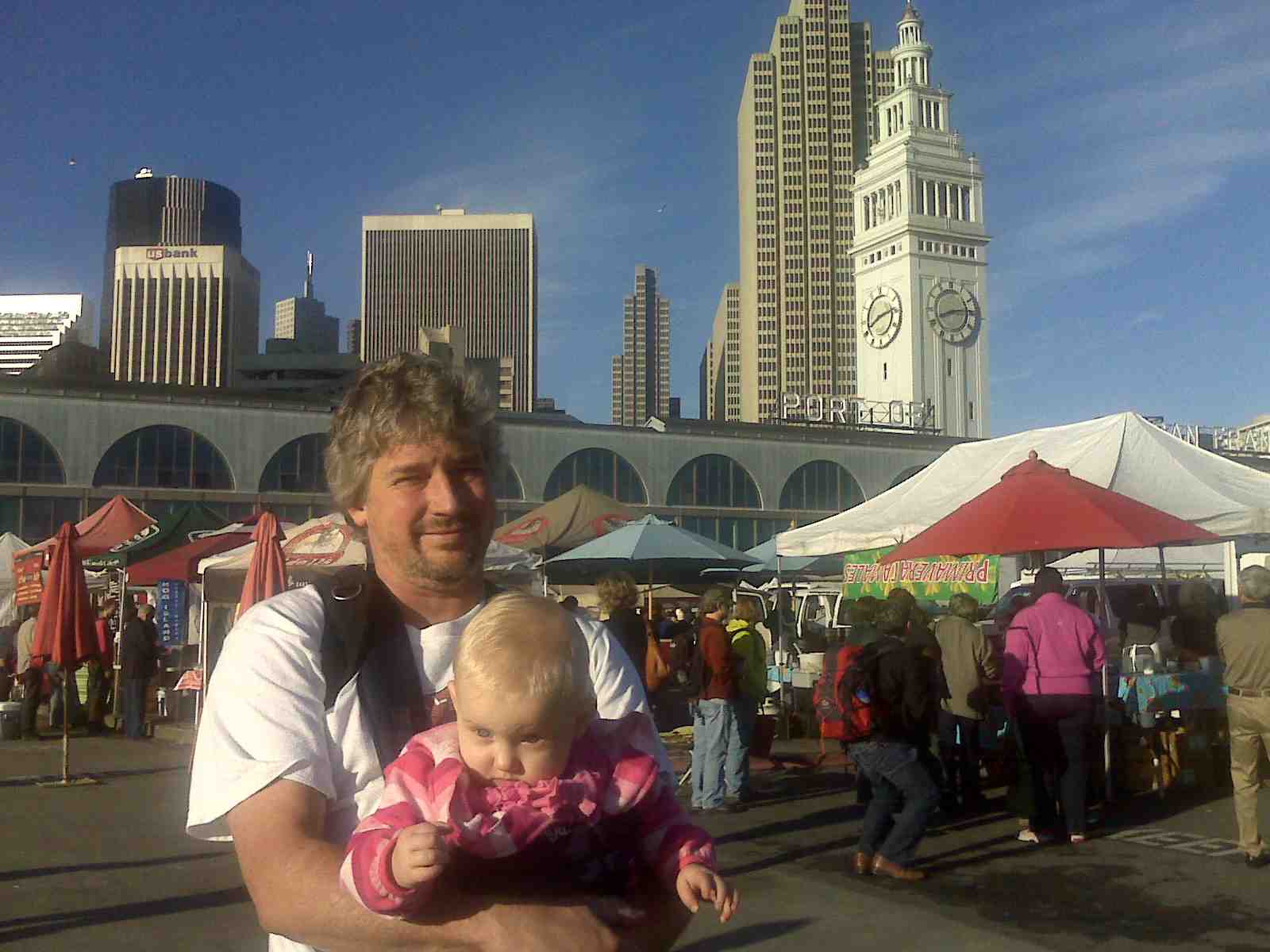I started going to the farmer’s market in Guelph, Ontario, Canada, in the fall of 1983. I’d been to other markets, lots of farmers in the family, but for the  first time I lived close to a downtown market (right, San Francisco market, 2009). For my third year as an undergraduate university student — what Americans would call my junior year — I had a room that used to be the garage in a semi-detached sorta house and was exceedingly cold in the winter. I lived with a mom and her 8-year-old son, and got free rent in exchange for a couple of hours of child care in the early evenings.
first time I lived close to a downtown market (right, San Francisco market, 2009). For my third year as an undergraduate university student — what Americans would call my junior year — I had a room that used to be the garage in a semi-detached sorta house and was exceedingly cold in the winter. I lived with a mom and her 8-year-old son, and got free rent in exchange for a couple of hours of child care in the early evenings.
I remained a regular at the market, through to 1988, and enjoyed chatting with farmers, and quickly discovered the best producers were eager and open to discuss any inquiries about their food. When I returned to live in Guelph in 1997, I went to the market a few times but soon soured on the activity. Some of the same producers were there, but the space had largely become a political and gimmick-filled flea market.
There was a new apple guy, who was selling unpasteurized apple cider in the post-Odwalla world, referring to the 1996 outbreak of E. coli O157:H7 in Odwalla juice containing unpasteurized apple cider that sickened 70 and killed a 16-month old in the U.S. He had installed his own microbiology lab on the farm, and was happy to share test results and methodology. That’s the kind of trust I’m looking for.
I’ve been to lots of other markets over the years (left, Toulouse), but find I can get the same shared social space and conversations about food at a supermarket. It’s not trendy, but it’s my experience.
The San Jose Mercury News reports this morning that small, organic farmers like Tom Willey who supplies 800 local families and West Coast retailers with a year-round supply of fresh produce, say stricter food-safety regulations, developed after a cluster of outbreaks of bacterial contamination in spinach and lettuce in 2006, threaten the principles upon which their farms are based.
The story says that Willey already adheres to the voluntary food-safety regulations deemed necessary by the organic farm community. Except organic standards are not food safety standards. Organic is a production system. Food safety is about fewer people barfing.
Trevor Suslow, a food-safety expert and plant pathologist at UC Davis whose research helped form the basis of the California Leafy Green Marketing Agreement, said,
"For the smaller growers, I don’t think it is reasonable to throw up their hands and say it doesn’t apply to us, or we are not the problem or we can never be the problem.”
Suslow also said regulations should be tailored to both the size and the nature of the operation, and that,
"Everybody needs to be doing something, but everybody doesn’t need to be doing the same thing.”
Agreed. I want to know what is being done to control microorganisms that could make people barf on any farm, or anywhere else.
I don’t care if the operation is large or small, organic or conventional, local or global. I care if food makes people sick.
A similar argument is going on in the Canadian province of Saskatchewan, where a provincial draft document outlining new guidelines for public markets has created some of the same faith-based arguments surrounding proposed U.S. legislation. One critic said,
"It will only be a matter of time before all farmers’ markets in Saskatchewan will cease to exist as we know them."
Not so, writes the owner of Lincoln Gardens, located in the Qu’Appelle Valley near Lumsden, Saskatchewan, and who sells at the Regina Farmer’s Market and on the farm.
“I welcome any changes that can improve accountability and public safety at the market level. I don’t believe that requiring commercial food processors to follow proper food handling techniques will put Farmers Markets out of business. It is not difficult or expensive to set up a private commercial, certified kitchen. And if a vendor is unable to do so in their own home, due to lack of space, lack of financial resources or they don’t own their home, they are able to obtain the use of a certified kitchen at many community centres, church halls or town offices. that doesn’t seem like such a big deal to me. …
"Our farm encourages all consumers to ask their vendor if they are following proper food safety guidelines, where do they bake, where do they grow, how do they transport the products etc. We have been improving our on farm food safety for several years now. Many of you will remember when Lincoln Gardens transported produce in recycled banana boxes! You may have noticed that we don’t do that anymore…we also provide hand sanitizer to customers at the farm and at the market so that they can avoid cross-contamination. We will continue to look far ways that we can improve the safety of your food. It is too bad that not everyone thinks this is important."
That sounds like the kind of grower I could talk with.
Like the best restaurants, the best farmers and the markets they supply will welcome questions about food safety along with a public disclosure system. The best will even promote their data-driven food safety efforts to build trust with a skeptical public.
